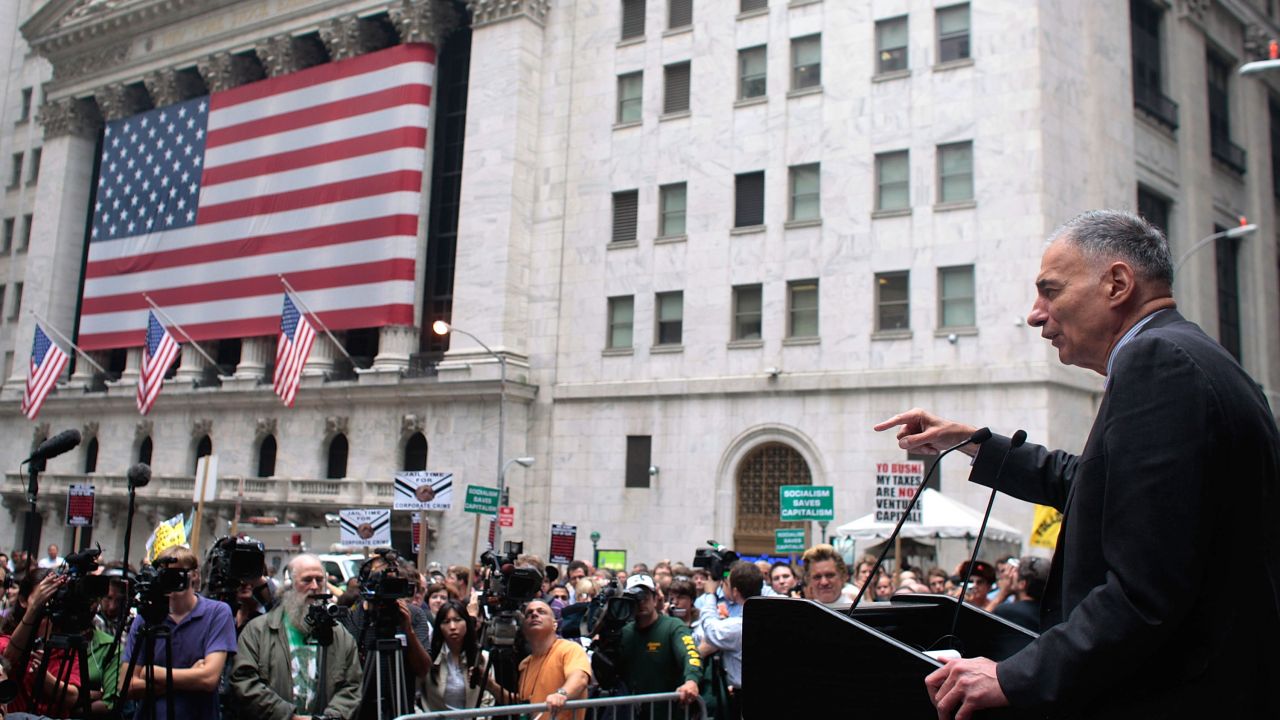
Ralph Nader speaking to crowd in front of the New York Stock Exchange. (Photo by Chris Hondros/Getty Images)
Ralph Nader may be America’s most giddily gloomy optimist.
At 82, the serial muckraker and sometimes (though not this year) presidential candidate has softened neither his principles nor his bite. Democracy, he says, is “beleaguered and eroded.” He sees the upcoming contest for the White House as likely to feature a pathological narcissist (“We have a major psychological problem heading for the Republican nomination,” Nader says of Donald Trump) and a “chronic militarist and Wall Street corporatist,” which is how he describes Democrat Hillary Clinton.
And don’t get him started on the millennials, a generation he sees as having been “raised corporate instead of civic,” on a diet of “junk food and junk programs” that have trained them to keep their eyes fixed squarely on whatever lighted screen is placed before them.
“The new opiate of the people is the smart phone,” declares Nader.
But this is no grumpy old guy hurling abuse from a rocking chair. More than a half-century after the publication of his breakout book Unsafe at Any Speed, Nader is still trying to give the world a chance to live up to his high standards. Next week, he’s renting out Constitution Hall in Washington, DC for his latest attempt: a convening of activists that he’s dubbed Breaking Through Power.
The four-day event will feature what you might call “Ralph Talks” by speakers running the cultural and ideological gamut from former Federal Communications Commissioner Michael Copps to punk rock laureate Patti Smith. He’s even got a couple of prominent Republicans, such as conservative legal expert Bruce Fein. “A lot of the things I’m talking about have left-right support,” says Nader, whose 2014 book Unstoppable outlined a plan for a left-right alliance to “defeat the corporate state.” He got blurbs from both Cornel West and Grover Norquist.
It’s the first of such gatherings that Nader is planning to host this year in hopes of incubating more grassroots activism and more closely monitoring such institutions as the media, Congress and the military-industrial complex. He’s also hoping to end what he considers a press moratorium on coverage of anti-establishment voices.
“Nobody calls these people up,” Nader says of his stable of speakers, who include environmentalists, energy experts, retired military personnel and one man who has invented a better wheelchair. “These are the experts and the movers and the shakers who have reshaped our country and they never get on Meet the Press. They never get on Face the Nation. They don’t even get on C-SPAN unless they write a book.”
This is not a problem for Nader. He’s been running the media circuit promoting his Constitution Hall event but turned down a chance to be on a CNN Sunday talk show. “I’m not interested in being part of a scramble of overtalk punditry and superficial speculation about horserace tactics,” Nader says he told CNN host Jake Tapper.
Overhauling the media to feature more substantive discussion is one of Nader’s chief aims — he’s devoting a whole day of his conference to considering ways to achieve that goal. Today’s news programs, he says, feature “insipid politicians” and “bloviators,” as he describes the pundits who dominate cable airwaves. Nader wants TV hosts to invite some of the change agents he’s featuring at his conference.
For example, he thinks Americans would be inspired to know how much difference can be made in food and technology safety with relatively few resources. “I think the entire budget of these groups is less than one CEO’s salary,” said Nader.
And while Nader is not shy about offering his biting commentary on the White House contest, he seems uninterested, seeing it as an obstacle to focusing attention on issues and people he believes are more deserving.
“They’re preempted by the presidential race,” Nader says of the activists and experts he’s featuring at his conference. “Commercialized elections now have reached a point in US history where they have become off limits to democracy, paradoxical as that may appear. “ Experts with substantive things to say about important issues are being bumped in favor of “well-combed people,” Nader says. “Our elections are now off-limits to civil society.”
He blames “commercial collaboration between the mass media and the candidates bankrolled by mass contributions from the super-rich,” adding quickly, “except for Bernie Sanders.”
He worries about attendance at his event. “How do you get people aroused?” worries Nader, is offering scholarships for those who can’t afford the registration fee and has arranged a live-stream of the four days of talks for those who can’t make it to Washington. For those already in the nation’s capital, he has even ordered 2,000 crisp new $2 bills (his favorite currency, he says, because it features the writers of the Constitution on the back) to offer to people on the street as an enticement to check out the talks. “They’re so discouraged and depressed and withdrawn,” he says.
Not Nader. He sees every problem as a potential path to a new solution.
He’s trying to expand nationally a successful program he started at his alma maters — Princeton University and Harvard Law School — that matches older alumni as funders and mentors of young graduates in public service careers. He recently took out a full-page ad in the Baltimore Sun to propose “birth-year gifts” — organizing Americans to pool their money and bequeath it for worthy projects. Nader helpfully included a list of 25. Oh, and he’s got another book coming out. He describes it as a fable in which an inventor creates software that allows animals, including insects, to communicate with humans and “tell them what they’ve been thinking about us all this time.”
Once, Nader says, he was tempted to become a pessimist. As a sophomore at Princeton during the 1950s, he said, “I got very discouraged with the state of the world: missiles aimed at the Soviet Union and the Soviet Union aiming at us.” He burrowed deep into the bowels of the campus library, looking for “the philosophers of pessimism to try to legitimize my sad view of the world.
“And I came upon Schopenhauer, who was the master,” says Nader, who still vividly remembers the volume in which he found the 19th century German thinker’s writings. “It was a brown book.” Apparently the inside was even less impressive than the cover.
“He didn’t convince me,” Nader continues. “So I have never looked back. I concluded that pessimism has no function, no purpose, other than to be an indulgent vanity of a presumed inquiring mind, and that optimism has to be the confrontation with reality in the world.”




